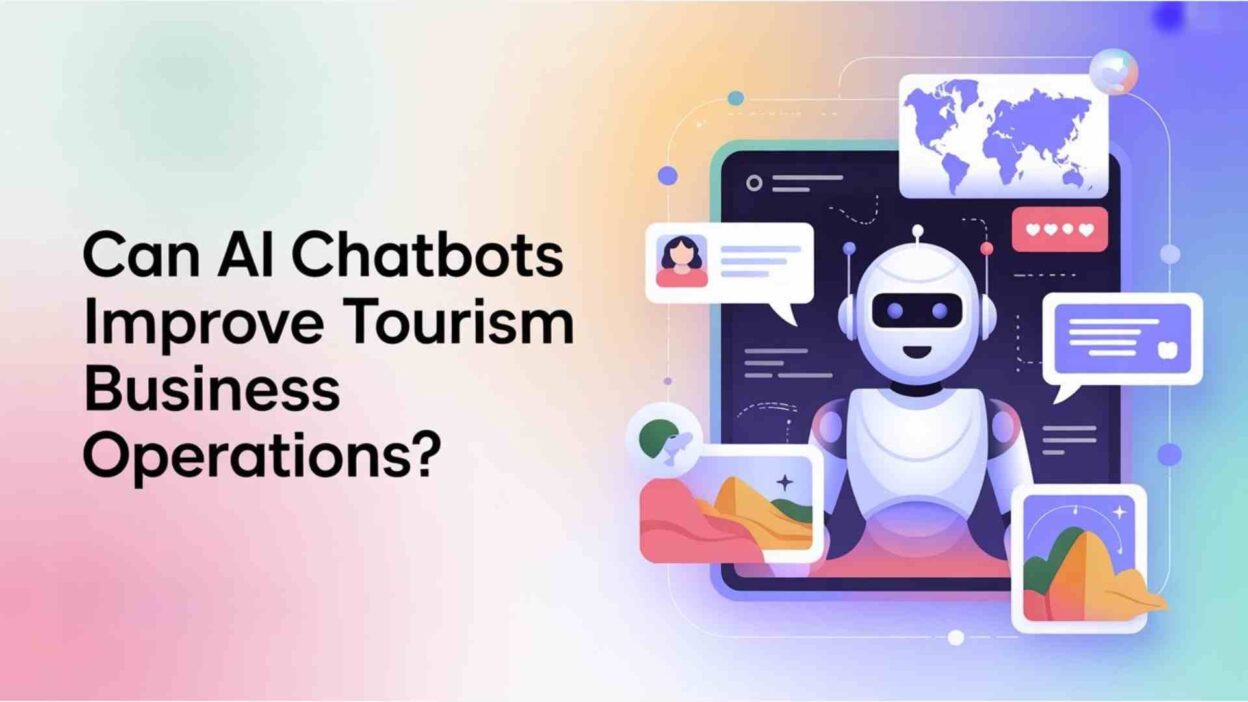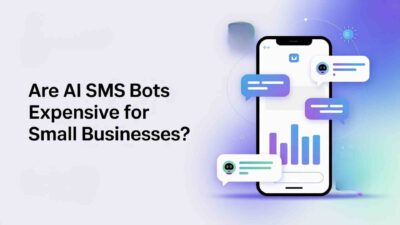TL;DR Tourism businesses face unique challenges every single day. Travelers expect instant responses to booking questions. Hotels receive inquiries at three in the morning. Tour operators juggle hundreds of customer requests simultaneously. Traditional customer service teams struggle to meet these demands efficiently.
Table of Contents
Top AI chatbots for tourism businesses have transformed how companies interact with travelers. These digital assistants handle routine questions without human intervention. They work around the clock without breaks or vacation time. The technology allows businesses to scale customer support without proportional cost increases.
AI in tourism technology continues advancing at remarkable speeds. Machine learning algorithms understand context better each year. Natural language processing decodes customer intent accurately. Tourism companies that embrace these tools gain competitive advantages in crowded markets.
Understanding AI Chatbot Technology in Tourism
Artificial intelligence powers modern chatbot systems through sophisticated algorithms. These programs analyze incoming messages and generate appropriate responses. Machine learning enables chatbots to improve performance over time through data analysis.
Tourism businesses benefit from specialized chatbot capabilities. Language translation features serve international travelers seamlessly. Integration with booking systems provides real-time availability information. Payment processing allows customers to complete transactions within chat conversations.
The technology differs significantly from simple automated response systems. Rule-based bots follow predetermined conversation paths. AI-powered chatbots understand variations in how people ask questions. They generate contextually appropriate answers rather than matching keywords to templates.
Natural Language Processing Capabilities
Natural language processing forms the foundation of effective chatbot communication. This technology allows computers to understand human language patterns. Travelers ask questions in countless different ways. AI systems must decode meaning regardless of phrasing.
Top AI chatbots for tourism businesses excel at interpreting traveler intent. Someone asking “what hotels have pools” receives the same information as “show me accommodations with swimming facilities.” The chatbot recognizes that both queries seek identical information.
Sentiment analysis adds another dimension to customer interactions. Chatbots detect frustration in messages and adjust responses accordingly. Angry customers receive more empathetic language and faster escalation to human agents. This emotional intelligence improves overall customer satisfaction scores.
Machine Learning and Continuous Improvement
Machine learning enables chatbots to become smarter through experience. Every conversation provides training data for future interactions. The system identifies patterns in successful and unsuccessful exchanges.
Tourism businesses see accuracy improvements over weeks and months. A chatbot might initially struggle with regional dialect variations. Continued exposure teaches the system to recognize local speech patterns. Performance metrics show steady enhancement without manual programming updates.
Supervised learning involves human review of chatbot conversations. Team members correct mistakes and provide better response examples. The AI incorporates this feedback into future decision-making processes. Unsupervised learning happens automatically as the system processes more interactions.
Customer Service Enhancement Through AI Chatbots
Customer service quality directly impacts tourism business success. Satisfied travelers leave positive reviews and return for future trips. Poor service experiences drive customers to competitors permanently. Top AI chatbots for tourism businesses maintain consistently high service standards.
Response time represents a critical customer service metric. Traditional email support might take hours or days to address inquiries. Phone systems leave callers on hold during busy periods. Chatbots respond instantly to every message, regardless of volume.
Personalization capabilities create memorable customer experiences. AI systems access customer profiles and previous interaction history. Returning travelers receive greetings by name and recommendations based on past preferences. This level of customization builds loyalty and encourages repeat bookings.
24/7 Availability for Global Travelers
Time zones create challenges for international tourism businesses. A traveler in Tokyo needs information while the staff in New York sleeps. Traditional business hours leave customers waiting for responses across significant time differences.
AI in tourism technology solves this availability problem completely. Chatbots handle inquiries at midnight just as effectively as noon. No question goes unanswered because humans need sleep. Global businesses serve customers in every time zone simultaneously.
Weekend and holiday coverage improves dramatically with chatbot implementation. Human teams require adequate time off for health and well-being. Chatbots maintain full operational capacity during these periods. Travelers planning trips during holidays receive immediate assistance.
Multilingual Support for International Visitors
Language barriers frustrate travelers and tourism businesses alike. A French tourist struggling to communicate in English might abandon a booking. Hiring multilingual staff for every language combination becomes prohibitively expensive.
Top AI chatbots for tourism businesses communicate fluently in dozens of languages. Real-time translation happens seamlessly within conversations. A traveler writes in Spanish and receives responses in Spanish. The business operates efficiently without multilingual human staff.
Cultural nuances get incorporated into chatbot programming. Different cultures have varying communication preferences and etiquette expectations. AI systems adapt tone and style based on detected language. Japanese customers receive formal, respectful language while American customers get casual, friendly responses.
Booking and Reservation Management Automation
Booking processes consume significant staff time and resources. Customers ask about availability, compare options, and change reservations repeatedly. Manual handling of these tasks reduces capacity for higher-value activities.
AI in tourism technology streamlines the entire booking workflow. Chatbots check real-time availability across accommodation inventory. They display options matching customer criteria instantly. Price comparisons happen automatically based on dates and preferences.
Reservation modifications create administrative headaches for tourism businesses. Customers want to change dates, add services, or cancel bookings. Chatbots process these requests immediately without human intervention. System integrations ensure inventory updates happen automatically.
Real-Time Availability and Pricing Information
Inventory management requires constant attention in tourism operations. Room availability changes minute by minute as bookings occur. Pricing fluctuates based on demand and seasonal factors. Staff members struggle to provide accurate current information.
Top AI chatbots for tourism businesses connect directly to property management systems. They query live databases for availability data. Customers receive accurate information without the delay of human lookup. This real-time access prevents double bookings and disappointed customers.
Dynamic pricing integration allows chatbots to offer appropriate rates automatically. The system checks current pricing rules and applies relevant discounts. Special promotions are surfaced to customers who qualify. Revenue optimization happens without requiring pricing expertise from every interaction.
Payment Processing and Transaction Security
Payment handling represents both an opportunity and a risk for tourism businesses. Convenient payment options increase conversion rates. Security breaches destroy customer trust and create legal liability.
AI chatbots facilitate secure payment processing within conversation flows. Customers complete transactions without leaving the chat interface. PCI compliance is maintained through proper integration architecture. Sensitive card information is never exposed to unnecessary systems.
Multiple payment method support accommodates diverse customer preferences. Credit cards work for some travelers, while others prefer digital wallets. International customers appreciate local payment option availability. Chatbots present appropriate choices based on customer location and profile.
Personalized Travel Recommendations
Generic recommendations fail to inspire modern travelers. Customers expect suggestions tailored to their specific interests and preferences. Manual personalization requires extensive staff time and customer knowledge.
Top AI chatbots for tourism businesses analyze customer data to generate customized recommendations. Previous booking history reveals accommodation preferences. Browsing behavior indicates activity interests. Survey responses clarify budget constraints and travel style.
Recommendation engines consider multiple factors simultaneously. A family with young children receives different suggestions than solo adventure travelers. Beach lovers see coastal properties while history enthusiasts get cultural city recommendations. The personalization increases booking likelihood significantly.
Activity and Experience Suggestions
Destination activities represent major revenue opportunities for tourism businesses. Travelers book tours, activities, and experiences beyond accommodation. Effective upselling requires understanding customer interests accurately.
AI in tourism technology powers intelligent activity recommendation systems. The chatbot learns what types of experiences resonate with different customer segments. Outdoor enthusiasts receive hiking and adventure tour suggestions. Food lovers see culinary experiences and restaurant recommendations.
Contextual awareness improves recommendation relevance. Travelers booking in winter get season-appropriate activity options. Families receive age-appropriate experience suggestions. The system considers party size, mobility limitations, and stated interests.
Dining and Entertainment Guidance
Restaurant recommendations enhance the overall travel experience. Tourists unfamiliar with destinations appreciate trustworthy dining guidance. Entertainment options like shows and events complete trip planning.
Top AI chatbots for tourism businesses maintain comprehensive local knowledge databases. Restaurant information includes cuisine types, price ranges, and customer ratings. Show schedules integrate with booking calendars. The chatbot suggests options matching customer profiles and availability.
Reservation assistance adds convenience to recommendations. Customers express interest in a suggested restaurant, and the chatbot offers to book a table. Integration with reservation platforms enables seamless confirmation. The traveler moves from suggestion to confirmed reservation in seconds.
Operational Efficiency and Cost Reduction
Labor costs represent major expenses for tourism businesses. Customer service teams require salaries, benefits, and management overhead. Scaling human teams proportionally with business growth strains budgets.
AI in tourism technology provides cost-effective scaling capability. A single chatbot handles hundreds of simultaneous conversations. The software license costs a fraction of human employee expenses. Businesses grow customer capacity without proportional cost increases.
Staff productivity improves when chatbots handle routine inquiries. Human agents focus on complex problems requiring judgment and empathy. Job satisfaction increases as repetitive tasks get automated. Team members engage in more meaningful work that leverages their expertise.
Reduced Response Time and Faster Resolution
Response speed influences customer satisfaction and conversion rates. Research shows customers abandon inquiries when waiting too long for answers. Fast responses capture booking intent while customers actively plan trips.
Top AI chatbots for tourism businesses eliminate wait times. Every message receives instant acknowledgment and a relevant response. No customer queue exists because the chatbot handles unlimited simultaneous conversations. Response time metrics improve dramatically post-implementation.
Resolution speed accelerates through chatbot efficiency. Simple questions about amenities or policies get answered immediately. Booking confirmations arrive seconds after payment completion. Customers appreciate the speed and efficiency compared to traditional service channels.
Resource Allocation Optimization
Human staff represents a finite resource requiring strategic allocation. Businesses must decide where to deploy team members for maximum impact. Misallocation wastes talent and reduces operational effectiveness.
AI chatbots free human agents to handle situations requiring human judgment. Complex complaints benefit from empathetic personal attention. High-value corporate clients receive dedicated service representative relationships. Routine inquiries no longer consume staff time better spent elsewhere.
Seasonal demand fluctuations create staffing challenges for tourism businesses. Peak seasons require large teams while off-seasons leave staff underutilized. Chatbots provide consistent capacity regardless of demand volume. Businesses avoid the costs of maintaining excess staff capacity.
Data Collection and Business Intelligence
Customer interactions generate valuable data for business improvement. Traditional service channels capture limited information from conversations. Manual analysis of customer feedback proves time-consuming and incomplete.
AI in tourism technology transforms every interaction into structured data. Chatbots log all customer questions and conversation patterns. Analytics platforms process this information to reveal business insights. Management gains visibility into customer needs and pain points.
Behavioral data informs strategic decision-making across the organization. Common questions highlight gaps in website information. Abandoned bookings reveal pricing sensitivity thresholds. Complaint patterns identify service issues requiring attention.
Customer Preference Tracking
Understanding customer preferences drives better business decisions. Travelers have distinct preferences regarding accommodation features, activities, and communication styles. Capturing and analyzing these preferences enhances service delivery.
Top AI chatbots for tourism businesses build detailed customer profiles automatically. Every interaction adds data points about individual preferences. A customer asking about wheelchair accessibility gets flagged for mobility considerations. Someone requesting quiet rooms receives that information in future stay suggestions.
Aggregate preference data reveals market trends and opportunities. Rising interest in eco-friendly accommodations might justify sustainability investments. Declining demand for certain amenities informs renovation priorities. The business adapts offerings based on actual customer desire.
Performance Metrics and Reporting
Business performance measurement requires accurate, consistent data. Manual tracking of service metrics proves unreliable and resource-intensive. Incomplete data leads to flawed business decisions.
AI chatbots generate comprehensive performance reports automatically. Conversation volume trends show seasonal patterns and growth trajectories. Resolution rates indicate chatbot effectiveness and training needs. Customer satisfaction scores measure overall experience quality.
Real-time dashboards provide operational visibility to management teams. Unusual conversation volume spikes might indicate website issues or viral marketing success. Average resolution time trends reveal whether chatbot training improves performance. Data-driven management replaces intuition-based decision-making.
Integration With Existing Tourism Technology
Tourism businesses use various software systems for different operational functions. Property management systems track inventory and reservations. Customer relationship management platforms store guest information. Accounting software manages financial transactions. Disconnected systems create inefficiency and data inconsistencies.
Top AI chatbots for tourism businesses integrate seamlessly with existing technology stacks. API connections enable real-time data exchange between systems. The chatbot queries the property management system for availability. It updates the CRM with new customer information automatically.
Integration eliminates redundant data entry and associated errors. Staff members no longer copy information between systems manually. Customers receive consistent, accurate information regardless of the communication channel. The technology ecosystem functions as a unified platform.
Property Management System Connections
Property management systems serve as operational hubs for hotels and accommodations. They manage room inventory, rates, and reservations. Integration with these systems is essential for chatbot effectiveness.
AI in tourism technology connects chatbots to leading property management platforms. The chatbot accesses real-time room availability for booking conversations. Price queries return current rates, including all applicable discounts. Reservation modifications update the property management system immediately.
Guest profile synchronization ensures data consistency across platforms. Information collected during chatbot conversations enriches existing guest records. Staff members see the complete customer history regardless of the interaction channel. This unified view enables superior personalized service.
Channel Manager and Distribution Integration
Tourism businesses distribute inventory across multiple online channels. Channel managers synchronize availability and rates across platforms. Chatbot integration extends this distribution strategy to conversational channels.
Top AI chatbots for tourism businesses connect to major channel management systems. Rate parity gets maintained across all distribution points automatically. Availability updates propagate to the chatbot immediately upon booking. Customers receive accurate, consistent information matching other channels.
Direct booking capture represents a key benefit of chatbot implementation. Travelers engaging with chatbots on business websites book directly. Commission-free direct bookings improve profit margins compared to third-party platforms. The chatbot encourages direct booking through seamless integrated experiences.
Top AI Chatbots for Tourism Businesses
Selecting the right chatbot solution requires careful evaluation of available options. Different platforms offer varying capabilities and specializations. Tourism businesses must match their specific needs with appropriate technology solutions.
Several leading platforms dominate the tourism chatbot market. Each brings unique strengths and ideal use cases. Understanding these differences helps businesses make informed selection decisions.
Hospitality-Focused Chatbot Platforms
Specialized hospitality chatbots understand tourism industry requirements deeply. These platforms include pre-built templates for common accommodation scenarios. Industry-specific integrations connect to major property management and booking systems.
Top AI chatbots for tourism businesses in this category offer proven tourism implementations. They understand hospitality terminology and common guest questions. Pre-configured workflows handle check-in processes, amenity inquiries, and concierge services. Implementation timelines shorten because of industry-specific features.
Training data from thousands of hospitality interactions improves accuracy. The chatbots recognize variations in how guests ask about breakfast times or parking availability. Industry knowledge gets embedded in the platform rather than requiring custom development.
Enterprise Chatbot Solutions
Large tourism companies often prefer enterprise platforms offering extensive customization. These solutions provide powerful tools for building complex conversation flows. Integration capabilities support connection to virtually any business system.
Enterprise platforms scale to handle massive conversation volumes across global operations. They support advanced features like voice integration and sophisticated analytics. Large organizations appreciate the flexibility and power despite higher complexity.
Implementation requires more significant time and technical expertise. Businesses need development resources to build custom tourism-specific capabilities. The investment pays off for companies with unique requirements and large scale.
Small Business Chatbot Tools
Small tourism operators need simple, affordable chatbot solutions. Complexity creates barriers to adoption for businesses without technical staff. User-friendly platforms with quick setup processes appeal to this segment.
Top AI chatbots for tourism businesses in this category offer template-based implementation. Drag-and-drop conversation builders require no coding knowledge. Pricing models align with small business budgets through per-conversation billing.
Limited customization restricts the handling of complex, unique scenarios. Small accommodations with straightforward needs find these limitations acceptable. The speed to value and low cost enable experimentation with minimal risk.
Implementation Strategies and Best Practices
Successful chatbot deployment requires thoughtful planning and execution. Technology alone does not guarantee improved business results. Strategic implementation maximizes return on investment and adoption rates.
Clear objectives guide chatbot development decisions. Some businesses prioritize cost reduction through automation. Others focus on revenue growth through improved conversion rates. Different goals require different chatbot configurations and conversation designs.
Phased rollouts reduce risk and enable learning. Many businesses start with a limited scope chatbot handling specific inquiry types. They expand capabilities gradually based on performance results. This approach prevents overwhelming teams and customers with dramatic changes.
Conversation Design Principles
Effective chatbot conversations feel natural and helpful to customers. Poor design creates frustration and drives travelers away. Professional conversation designers understand human communication patterns.
AI in tourism technology requires tourism-specific conversation flows. Questions about room amenities deserve detailed, helpful responses. Booking conversations should progress logically through the decision process. The chatbot personality should match the overall brand voice and values.
Fallback strategies handle situations beyond chatbot capabilities gracefully. The system recognizes when it cannot help and offers alternatives. Human agent escalation provides a safety net for complex situations. Customers never feel trapped in ineffective automated loops.
Staff Training and Change Management
Introducing chatbots changes how customer service teams work. Staff members may fear job loss or resist new technology. Effective change management addresses concerns and builds enthusiasm.
Training programs explain how chatbots enhance rather than replace human work. Team members learn to handle escalated complex inquiries from chatbot handoffs. They understand the chatbot as a tool that makes their jobs more interesting.
Top AI chatbots for tourism businesses include agent interfaces showing chatbot conversations. Human agents can monitor interactions and intervene when necessary. This oversight capability builds confidence in the technology and ensures quality control.
Measuring ROI and Success Metrics
Justifying technology investments requires demonstrating tangible business value. Chatbot implementations should produce measurable improvements in key performance indicators. Tracking the right metrics proves success to stakeholders.
Cost savings represent an obvious financial benefit. Businesses calculate salary expenses saved through reduced staffing needs. They measure decreased overtime costs during peak seasons. Support cost per interaction drops significantly with chatbot automation.
Revenue impact matters even more than cost reduction for growth-focused businesses. Conversion rate improvements directly increase booking revenue. Average booking value rises through effective upselling. Customer lifetime value grows through enhanced satisfaction and loyalty.
Customer Satisfaction Scores
Happy customers represent the ultimate measure of customer service success. Satisfaction surveys gather direct feedback about experience quality. Chatbot implementations should maintain or improve satisfaction levels.
AI in tourism technology influences satisfaction through multiple factors. Response speed improvements delight customers accustomed to long wait times. 24/7 availability serves travelers when they need help most. Accuracy and helpfulness determine whether customers feel well-served.
Comparative analysis shows satisfaction differences between chatbot and human interactions. Some businesses discover chatbots produce higher scores for routine inquiries. Complex issues still benefit from human agent empathy and judgment. The data informs optimal channel assignment strategies.
Conversion Rate Analysis
Converting inquiries into bookings drives tourism business revenue. Every percentage point improvement in conversion yields a significant financial impact. Chatbot implementation should positively influence conversion metrics.
Top AI chatbots for tourism businesses remove friction from the booking process. Instant answers eliminate doubts that cause abandonment. Personalized recommendations increase booking confidence. Seamless payment processing reduces transaction failure rates.
A/B testing isolates chatbot impact on conversion rates. Businesses compare periods before and after the chatbot launch. They analyze conversion differences between chatbot-assisted and unassisted bookings. Statistical significance determines whether observed improvements resulted from the chatbot.
Addressing Privacy and Security Concerns
Tourism businesses collect sensitive personal and financial information. Travelers entrust companies with passport details and credit card numbers. Chatbot systems must protect this data rigorously.
Data protection regulations like GDPR impose strict requirements on businesses. Non-compliance creates legal liability and financial penalties. Chatbot implementations must include appropriate privacy safeguards.
Transparent privacy policies inform customers about data collection and usage. Chatbots should explain what information gets stored and why. Customers appreciate knowing their data receives proper protection.
Secure Data Handling Practices
AI in tourism technology requires a robust security architecture. Encryption protects data in transit between customers and chatbot systems. Secure storage prevents unauthorized access to conversation logs.
Access controls limit which team members can view customer conversations. Role-based permissions ensure staff see only information necessary for their responsibilities. Audit logs track all data access for accountability.
Regular security assessments identify potential vulnerabilities before exploitation. Penetration testing simulates attack scenarios. Security patches get applied promptly to address discovered issues.
Compliance With Tourism Regulations
Tourism businesses operate under various regulatory frameworks. Accommodation providers must comply with local hospitality laws. Tour operators face safety and liability requirements. Chatbots must operate within these legal boundaries.
Top AI chatbots for tourism businesses include compliance features for regulated industries. Age verification prevents minors from booking age-restricted activities. Liability waivers get properly disclosed and acknowledged. Terms and conditions become part of the booking conversation flow.
Documentation capabilities support regulatory compliance obligations. Conversation logs provide records of customer agreements and disclosures. These records protect businesses in disputes or regulatory audits.
Future Trends in AI Tourism Technology
AI capabilities continue advancing at accelerating rates. Today’s cutting-edge features become standard expectations quickly. Tourism businesses must stay informed about emerging trends.
Voice-enabled chatbots expand interaction possibilities beyond text. Travelers speak naturally to AI assistants in their native languages. Voice recognition accuracy improves constantly through machine learning advances.
Augmented reality integration creates immersive preview experiences. Customers explore hotel rooms virtually before booking. Destination chatbots show points of interest through smartphone cameras.
Predictive Analytics and Proactive Service
Future AI systems will anticipate needs before customers express them. Predictive models analyze booking patterns and customer behavior. The chatbot reaches out proactively with relevant suggestions.
AI in tourism technology will recognize signals indicating booking intent. A customer browsing destination content multiple times might receive a personalized offer. Someone researching activities gets proactive recommendations matching their interests.
Proactive problem resolution prevents issues from affecting customer experience. The system detects flight delays and automatically offers itinerary adjustments. Weather forecasts trigger suggestions for indoor activities when rain threatens.
Emotional Intelligence Enhancement
Next-generation chatbots will understand and respond to customer emotions more effectively. Sentiment analysis becomes more sophisticated and nuanced. The AI detects subtle cues indicating frustration, excitement, or uncertainty.
Top AI chatbots for tourism businesses will adapt their communication style based on the emotional state. An excited customer planning a honeymoon receives enthusiastic congratulatory messages. A stressed traveler dealing with cancellations gets calmer, reassuring responses.
Emotional intelligence creates more satisfying human-like interactions. Customers feel understood and valued even when communicating with AI. This capability bridges the gap between automated efficiency and human empathy.
Read More: Why Hire a Gaming Development Company for Your Next Project?
Conclusion

Tourism businesses face tremendous pressure to deliver exceptional customer experiences efficiently. Travelers expect instant responses to inquiries at any hour. Traditional service models cannot meet these demands cost-effectively. Top AI chatbots for tourism businesses provide compelling solutions to these challenges.
AI in tourism technology has matured beyond experimental status. Thousands of successful implementations demonstrate clear return on investment. Leading tourism companies consider chatbots essential rather than optional technology. Implementation success requires strategic planning and thoughtful execution.
Privacy and security considerations demand careful attention throughout implementation. Travelers entrust businesses with sensitive personal information. Robust data protection measures maintain customer trust and regulatory compliance.
Tourism businesses should begin exploring chatbot opportunities immediately. Even modest implementations deliver meaningful improvements in customer experience and operational efficiency. Early adopters gain experience and competitive advantages.
AI in tourism technology represents the future of customer service in this industry. Forward-thinking businesses adopt these tools to serve travelers better. They invest in technology that enables growth without proportional cost increases.





